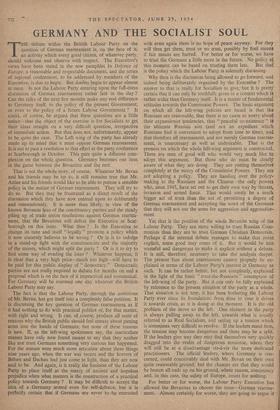GERMANY AND THE SOCIALIST SOUL
That is not the whole story, of course. Whatever Mr. Bevan and his friends may be up to, it still remains true that Mr. Attlee and his friends would like to be able to pursue a sensible policy in the matter of German rearmament. They will try to do so. But they may be frustrated as a direct result of the discussion which they have now entered upon so deliberately and ostentatiously. It is more than likely, in view of the known Bevanite bias of the constituency parties and the steady piling up of trade union resolutions against German rearma- ment, that the Bevanites will defeat the Executive at Scar- borough on this issue. What then '? Is the Executive to change its tune and itself " loyally " promote a policy which it now sincerely believes to be wrong ? Or is it to indulge in a stand-up tight with the constituencies and the majority of the unions, which might split the party ? Or is it to try to find some way of evading the issue ? Whatever happens, it is clear that a very high price—much too high—will have to be paid for this public display of " democracy." Democratid parties are not really required to debate for months on end a proposal which is on the face of it impractical and nonsensical. For Germany will be rearmed one day whatever the British Labour Party may say. with arms again there is no hope of peace anyway. For they will then get them, trust or no trust, possibly by foul means if fair means are barred. For better or for worse, we have to trust the Germans a little more in the future. No policy 4 this moment can be based on trusting them less. But that is the policy which the Labour Party is solemnly discussing.
Why then is the discussion being allowed to go forward, and indeed being deliberately organised by the. Executive ? The answer to that is really for Socialists to give, but it is pretty certain that it can only be truthfully given in a context which i4 rather wider than Germany itself. It is a matter of fundamental attitudes towards the Communist Powers. The basic argument on which all the left-wing policies are based is that the Russians are reasonable, that there is no cause to worry about their expansionist tendencies, that peaceful co-existence " i9 the ultimate Russian aim (and not an expedient which Russians find it convenient to adopt from time to time), and that therefore all rearmament, and not merely German rearma* ment, is unnecessary as well as undesirable. That is the premiss on which the whole left-wing argument is constructed. There are men of good will who would very much like to adopt this argument. But those who do must be clearly aware of what they are doing. They are putting themselves completely at the mercy of the Communist Powers. They aro not adopting a policy. They are handing over the policy making to the Russians and the Chinese—the only powers who, since 1945, have set out to get their own way by threats, invasion and armed force. That would surely be a much bigger act of trust than the act of permitting a degree of German rearmament and accepting the word of the Germant that they will not use the arms for aggression and aggrandise- ment.
Yet that is the position of the whole Bevanite wing of the Labour Party. They are more willing to trust Russian Com- munists than they are 'to trust German Christian Democrats. Perhaps if the internal debate manages to make that point explicit, some good may come of it. But it would be less wasteful and dangerous to make it explicit without a debate. It is still, therefore, necessary to take the analysis deeper. The present fuss about rearmament cannot properly be ex- plained in terms of the Labour Party's interest in Germany as such. It can be rather better, but not completely, explained in the light of the basic " trust-the-Russians" assumption of the left-wing of the party. But it can only be fully explained by reference to the present situation of the party as a whole. That situation is not new; it has been bothering the Labour Party ever since its foundation; from time to time it drives it towards crisis, as it is doing at the moment. It is the old problem of the move to the left. One element in the party is always pulling away to the left, towards what is usually referred to as Real Socialism, and setting up a tension which is sometimes very difficult to resolve. If the leaders stand firm, the tension may become dangerous and there may be a split. If the leaders give way they may find themselves very quickly dragged into the realm of dangerous nonsense, where they will still be at a disadvantage vis-d-vis the more dedicated practitioners. The official leaders, where Germany is con- cerned, could conceivably deal with Mr. Bevan on their own quite reasonable ground; but the chances are that they would be beaten all ends up on his ground, where reason, consistency and, in this case, the safety of Europe, count for nothing.
For better or for worse, the Labour Party Executive has allowed the Bevanites to choose the issue—German rearma- ment. Almost certainly for worse, they are going to argue it at length. The chances are that by next October Mr. Attlee and Mr. Morrison will be wrestling with a German policy which has been passed by a party majority, but which they themselves know will not work. There is no comfort for anyone in this prospect, but at least there is a moral for the present Government. It must begin to force the pace in the matter of German rearmament. Either it must take a more positive line towards the proposed European Defence Com- munity or it must promote a workable alternative. This is no time for exploratory conferences and general talks. It is a time for action. German rearmament is a question which must be settled by the present Government, before the Socialists have a chance to come in and plunge it into confusion.



































 Previous page
Previous page